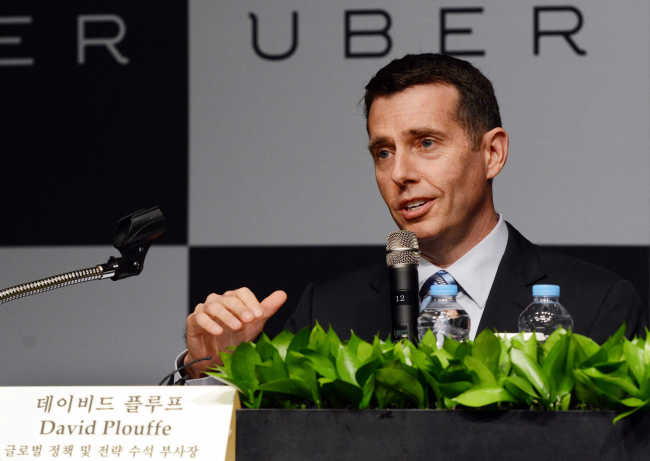Uber, the U.S. ride-hailing app operator, proposed Wednesday a new registration system for its Korean drivers, pledging to cooperate with local regulators.
 |
| David Plauffe, Uber’s senior vice president of policy and strategy, speaks during a press conference at a Seoul hotel on Wednesday. (Uber Korea) |
David Plauffe, Uber’s senior vice president of policy and strategy, told reporters in Seoul that the taxi start-up wanted to come up with forward-looking regulations along with city and government officials here.
“Our purpose is not competing with taxi drivers. We want to simply offer affordable and reliable alternatives,” he said.
“Uber would help lift up the taxi industry overall. This is not a zero-sum game.”
According to the Uber executive, the proposed system would require drivers to undergo minimum training and tighter criminal background checks, while passengers would be better insured.
“Cities around the world are adopting this approach. Because what we provide are jobs, we are starting to share data with cities,” he said.
He added that the company had already made the proposal to the Korean government and related talks were underway.
But he didn’t elaborate on specific meeting schedules during his three-day stay in Korea.
Uber, which is now valued at about $40 billion, has faced a series of legal problems around the world amid growing accusations that the company does not meet national transportation rules.
In Korea, authorities indicted Travis Kalanick, Uber’s chief executive, in connection with licensing laws that only licensed cabs should provide taxi services.
The Korea Communications Commission, the nation’s telecom regulator, also recently said it would file a complaint against the company for violating telecommunication information laws.
Amid growing legal woes, Uber hired Plauffe, a longtime confidant of U.S. President Barack Obama, as policy and strategy chief in August as part of the efforts to build better relationships with government officials.
His visit to Seoul, however, seemed to be fueling the anger among taxi drivers here.
Outside the hotel where the press conference was held, dozens of members of taxi associations protested his visit, holding up banners calling for Uber to stop its services in Korea.
“We want to make it clear that there will be no more talks with Uber, whose services are illegal in Korea,” said a taxi driver, calling his visit an intention to solve the issue politically.
There are some 40,000 Uber drivers in the U.S. alone. But the company declined to reveal sales figures in Korea, including the number of drivers. Uber Korea was launched in February 2013.
By Lee Ji-yoon (jyle@heraldcorp.com)

